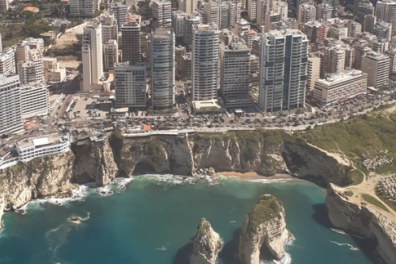Scientific report on Greta Sala's mission to Beirut (October 2, 2022 - January 28, 2023)

Thanks to a mobility grant provided by CERMOM, on October 2, 2022, she went on assignment to Beirut, where she remained until January 28, 2023. A contract PhD student since October 2021, her work focuses on Syrian novel production over the last twenty years, concentrating in particular on the progressive affirmation of the individual (as subject, but also as character) within the contemporary novel. Unable to travel to Syria for obvious security reasons, she considers Lebanon, and in particular its capital, to be a particularly suitable location for carrying out her research project, for a number of reasons.
Firstly, the period spent in Beirut was an opportunity to improve her Arabic language skills, particularly in the Lebanese dialect, through daily practice and participation in refresher courses. The month of October, in particular, was almost entirely devoted to attending these courses, which she then continued to attend on a more sporadic basis, so that she could also devote herself to advancing her research. During the week of October 15-21, she also took part in the first session of the HoRÉA (Horizons de Renouvellement des Études Arabes) Doctoral Academy. HoRÉA is an interdisciplinary training and support program for some fifteen doctoral students from all disciplines in the humanities and social sciences, whose work focuses on the Arab world. The first course, in particular, was devoted to the Arabic language. This macro-theme was addressed by researchers from a variety of disciplines, including Frédéric Lagrange, Francesco Chiabotti, Pauline Koetschet, Leyla Dakhli, Éric Vallet and Iyas Hassan (the latter two being the Academy's organizers). From November onwards, she spent most of her time at the Institut français du Proche-Orient (Ifpo), consulting the works held in its library. Transferred to the Lebanese capital a few months after the start of the Syrian crisis, the library was originally based in Damascus, and collects documents that are particularly useful for her research work. An obvious example is the latest works by Hassan Abbas, a highly regarded Syrian literary critic and Ifpo research associate for almost twenty-five years. Taking part in the various initiatives organized by the Institute also enabled her to meet and exchange ideas with other Ifpo doctoral students and researchers, in an extremely stimulating international context. In particular, she got to know a number of researchers working on Syria in the same way as her, which enabled her to delve deeper into certain questions linked to her work and to adopt new research perspectives. One such meeting was with Jamal Chehayed, a renowned literary studies researcher normally based in Syria, whom she interviewed about the current literary scene. Nibras Chehayed is also attached to Ifpo, and she invited him to present a series of works published under his direction as part of the HALQA meetings, an association of doctoral students on modern and contemporary Muslim worlds, of which she is a member. Finally, from January 25 to 27, Ifpo hosted an international symposium on Syria, organized by the "SHAKK. From revolt to war: conflicts, displacements, uncertainties". The three-day symposium, entitled "History and memory in the face of revolt and war in Syria", provided an opportunity to take stock of everything that has happened in the country over the last twelve years, using a multidisciplinary approach. The topics covered, ranging from the historical to the geopolitical, as well as the sociological, artistic and literary, enabled him to broaden his knowledge of a context as rich and complex as that of Syria. Because of her interest in the activities organized by Ifpo, of which this colloquium is an excellent example, as well as in the various lines of research promoted by the Institute, at the end of January she applied for associate doctoral status. Finally, it's worth noting that Beirut, home to numerous publishing houses, is still the place of publication for many, if not most, Syrian novels, making for a particularly effervescent cultural life. During her stay, she also took part in two literary festivals: the first edition of the Franco-Lebanese festival "Beirut Livres" (October 19-30), and the 59th edition of the "Salon du livre arabe" (November 27-December 10).
All these elements made this mission an invaluable experience for the research work she undertook, as well as an extremely enriching and intellectually stimulating life experience. With the aim of deepening and completing all that she was able to start during this first stay, she will return to Beirut in the period between the end of March and the end of June 2023, thanks to new funding provided by the Doctoral School and CERMOM, whom she would like to thank.